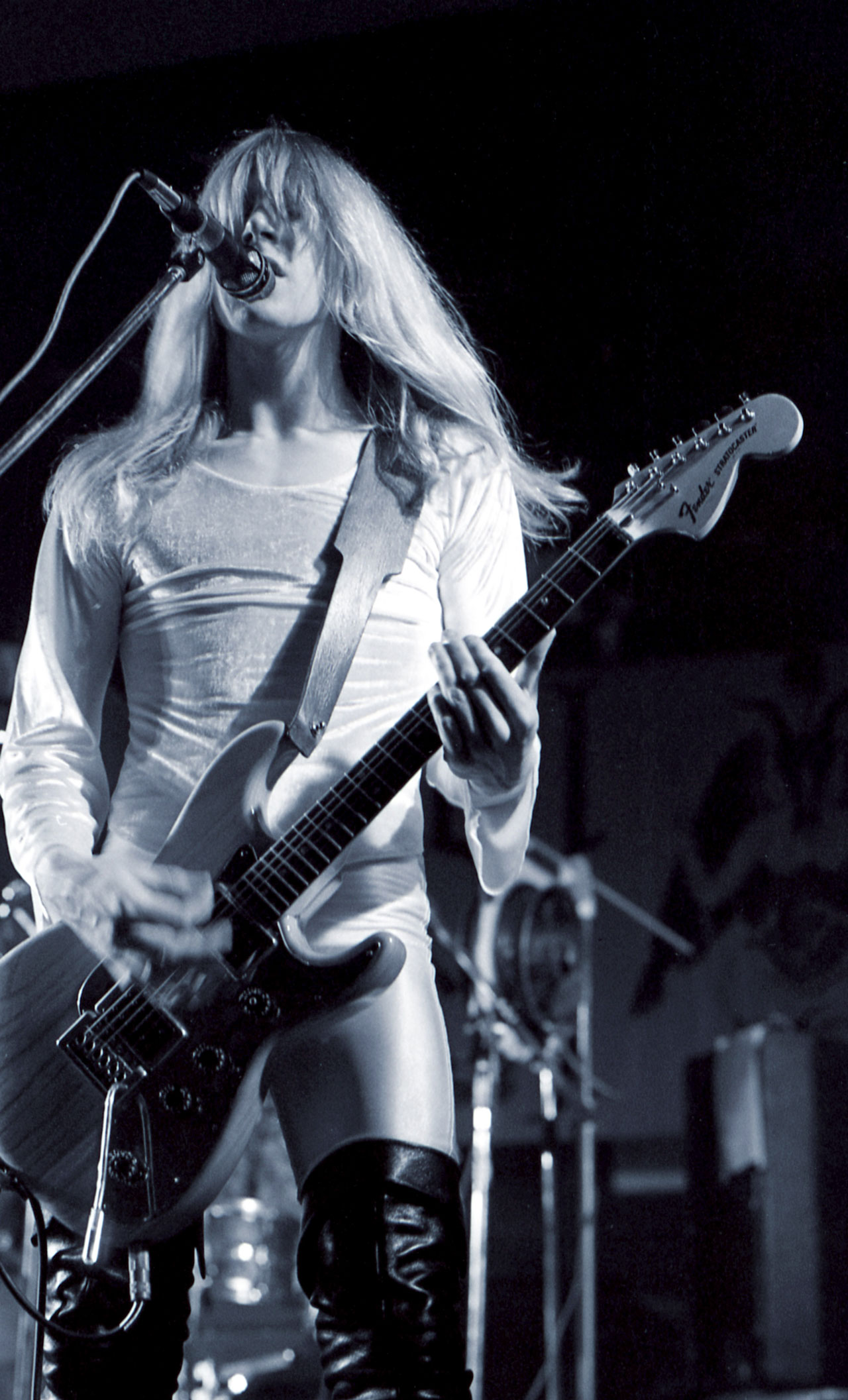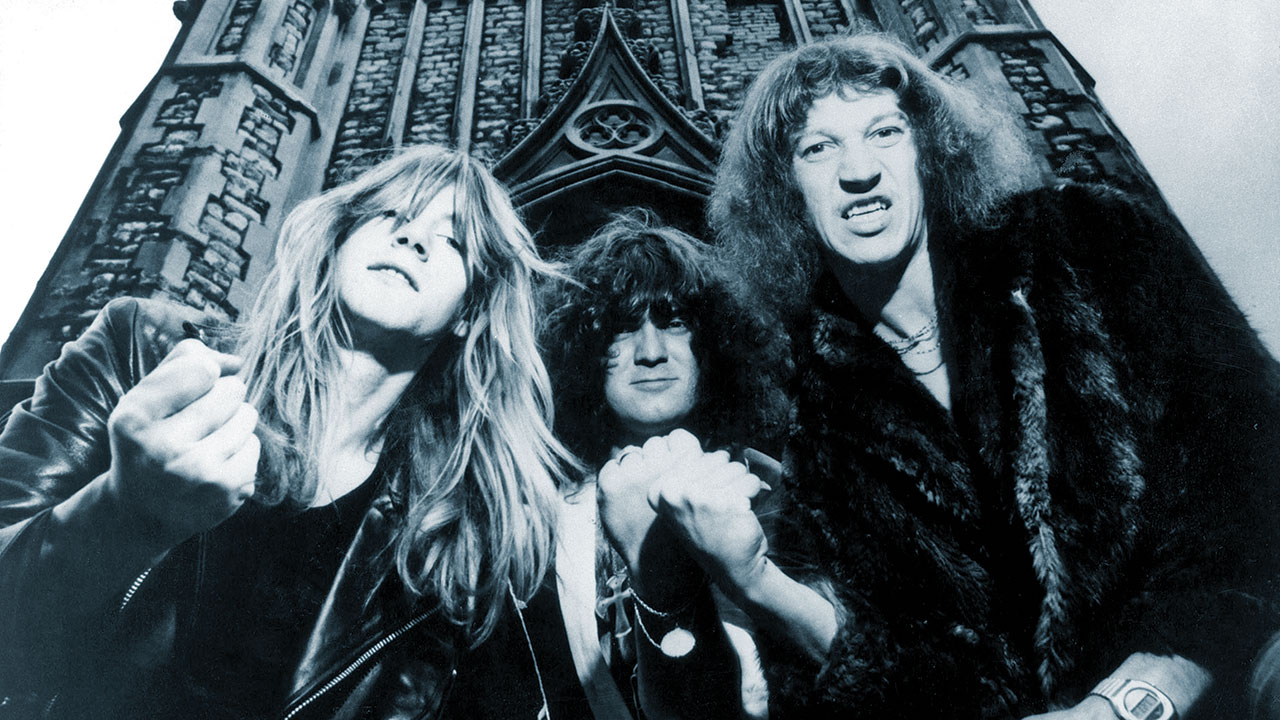Most musicians would absolutely love to pick the song that becomes their most cherished anthem. Unfortunately, life doesn’t work like that. As he cheerfully admits today, Angel Witch singer/guitarist Kevin Heybourne wrote the song that would give his band its name and become their perennial set-closer, when he was still a teenager, “literally just mucking about on my guitar, trying to write a song.
“It’s not like any of our other stuff, is it?” he continues. “At that point there was no Angel Witch anyway. I was just finding my feet as a songwriter. It was just bedroom stuff, when your parents tell you turn it down, you know?”
Much has been written about those heady days in the early 80s when the New Wave Of British Heavy Metal swept across the UK, conjuring countless great bands and inspiring Metallica in the process. But with the obvious exceptions of Iron Maiden, Def Leppard and Saxon, few of the movement’s key players truly deserved legendary status: Angel Witch being the key exception.
Darker, heavier and more adventurous than their innumerable peers, Kevin’s crew may not have equalled the commercial achievements of the aforementioned legendary trio, but their self-titled 1980 debut album is widely and rightly regarded as one of the genuine classic records of that era.
And while the upbeat boogie rock of its opening title track (yes, it’s Angel Witch by Angel Witch from the album Angel Witch) is in no way typical of their sound, it is a certified NWOBHM anthem. As Kevin notes with a chuckle, if he had tried to write a song that would endure for 40 years, it definitely wouldn’t have worked out.
“The whole NWOBHM thing didn’t exist when I wrote Angel Witch,” he recalls. “We were called Lucifer at that point and we were just a heavy rock band. I was in love with Sabbath, you know? I didn’t like anything else I was hearing. I liked bands like Led Zep and Deep Purple, but I preferred the Sabs because it just made more sense to me, with everything that was happening around me. I thought, ‘Why is everyone writing love songs?’ I was into the fantasy thing and horror and I just felt that was more of the way to go.”
In fact, Angel Witch is one of Kevin’s band’s only upbeat and cheerful tunes, with lyrics that do seem to point to the internal monologue of a surly teenager. In stark contrast to the music, which kicks all manner of unholy arse, lines like, ‘The more love I feel for you, the more you fade away’ are unlikely to give Slayer sleepless nights.
“Well, it was a load of shit that just came out of my head at 17 years old!” the guitarist laughs. “It’s like a love song, but gone wrong. But I didn’t spend days agonising over the words. It was just another rock song. I’ve no fucking idea what would go through a 17-year-old’s head now, but you had to think on your feet back then. Now you just go on YouTube and learn someone else’s solo or whatever. It’s a shame, really.”
While the rest of the material Kevin was writing as an aspiring teenage musician tended towards a more overtly Sabbath-influenced sprawl of riffs and atmosphere, Angel Witch itself was a snappy, three-minute rampage with a brilliantly simplistic chorus (‘You’re an angel witch! You’re an angel witch!’) that, as it turns out, even incredibly drunk people at metal shows can sing along with. None of this was in Kevin’s mind at the time, however. He was just trying to emulate one of his favourite bands.
“I’d been listening to a (British psych rock legends) Pink Fairies track, Walk Don’t Run,” Kevin says. “It wasn’t their song, it was originally by The Shadows, but I just loved the groove they used for that and the way there was a pause between hitting each chord.
I just worked around that and it just evolved from there. It was easy. The intro guitar part came a bit later. I thought, ‘I’ve got to start it somehow!’ I’ve got no idea where that came from. I was just messing around with the E and the B string, just to follow the chords, and it just appeared!”
Lucifer became Angel Witch in 1978, just in time for the arrival of the New Wave Of British Heavy Metal. The band’s eventual breakthrough came three years later when they contributed a track, Baphomet, to a compilation album called Metal For Muthas that was released by EMI in February 1980.
With two early Iron Maiden tracks and Baphomet standing out as the obvious highlights, it swiftly became a cult classic among NWOBHM aficionados, with Angel Witch widely acknowledged as the pick of the nascent bunch. As a result, as Maiden strode imperiously towards world domination, Kevin’s band were next in line for a significant record deal.
“We were actually one of the last bands to get signed from the rest of the NWOBHM bunch, but we were offered a deal by EMI,” Kevin remembers. “But I didn’t want to do it, mainly because Maiden had already been signed. The other guys in the band really wanted to do it, but the guy that was managing us at the time said, ‘Do you really want to be under the shadow of a band that have already made it?’ Maiden got a big deal. So we walked away from that. I don’t regret it. You can’t go back and change it.”

Signing instead to the more low-key Bronze Records imprint, Angel Witch headed to Roundhouse Studios in London, in autumn 1980, to record their first album. At this point, Kevin felt he was progressing as a songwriter and that Angel Witch was probably a bit too lightweight for inclusion on what could be the most important album his band would ever make.
“I honestly didn’t think about doing the song for the album, but everyone said it had to be a bloody single!” he laughs. “The producer said, ‘It’s got to be done!’ so that happened. It evolved in the studio, actually. I changed a few bits and shortened it, because it used to be much longer with three verses and an extremely long solo, which I call ‘practising on stage’! Ha ha ha!”
Angel Witch’s debut was released in December 1980, receiving a flurry of great reviews along the way. Nearly 40 years on, it still stands out as one of the few genuine classics of the NWOBHM era. But while deep cuts like Atlantis and Angel Of Death are a truer representation of Kevin Heybourne’s unique song- writing, it was the album’s titular opening track – released as a single just before the album’s unveiling – that somewhat inevitably became Angel Witch’s not-so-secret weapon for all future live engagements.
“Yeah, people were liking it straight away,” Kevin says. “There was a big push from the record company when it was released as a single. So people knew it and they expected it and it ended up that we had to play it. I think at one point we were doing it twice, at the beginning of the set and at the end! That was stupid, really. But yeah, as a song, it’s basically nailed to my back! Ha ha ha!”
After calling it a day in the mid-80s, Kevin brought Angel Witch back from the dead multiple times, most recently reuniting the band in 2008 with a new line-up and realising, much to his surprise, that they were more in demand than ever. Today, they are about to release Angel Of Light, their fifth studio album (and second since reconvening in 2008), and it’s obvious that Kevin is extremely happy with the results.
It’s a thunderous but versatile record, full of colossal riffs and jagged old-school hooks, and easily the most impressive Angel Witch record since that seminal debut. As Kevin notes, the other members of the current line-up are all genuine fans of the band, and while he may never be able to scratch Angel Witch from the setlist, playing the song with people who truly love it has transformed the whole experience.
“Oh, it makes a huge difference. It wasn’t ever like that in the past. This band is probably the best we’ve ever been, except maybe for the line-up we had with Bill [Steer, Carcass guitarist and Angel Witch member between 2010 and 2013]. But it’s close! These guys are all so sincere and into it and we all look at things the same way.” So you’re definitely still happy to keep playing Angel Witch every night?
“Oh, I have to. It’s the name of the band! If you take it out then there is no Angel Witch. Ha ha ha!”
Have you ever considered attempting to write another song like that? Could you repeat the trick?
“It could never happen. But maybe I got close to it on the new album. I think that Don’t Turn Your Back has got the same kind of energy in places. It’s got an element of that Angel Witch thing, but I don’t think I’ll ever write another one that lives on like that one. I genuinely appreciate it, every time we play it. People still love it. I’m blown away every time.”

